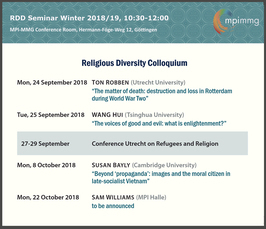"Data management in anthropology: the next phase in ethics governance?"
Religious Diversity Colloquium Winter 2018/19
- Date: Nov 12, 2018
- Time: 10:30 AM - 12:00 PM (Local Time Germany)
- Speaker: Peter Pels (Leiden University)
- Peter Pels (1958) is Professor in the Sociology and Anthropology of Africa at the Department of Cultural Anthropology and Development Sociology of the University of Leiden since 2003. He graduated in social anthropology at the University of Amsterdam on a study of Catholicism in East Africa (1993), and worked there at the Research Centre Religion and Society between 1995 and 2003. He published on religion and politics under colonialism, the history of anthropology, the anthropology of magic, social science ethics, visual and material culture, archaeology and science fiction. He was the editor-in-chief of Social Anthropology/Anthropologie sociale, the journal of the European Association of Social Anthropologists, from 2003 until 2007. Between 2006 and 2015 he was an advisor to the Çatalhöyük Research Project led by Stanford archaeologist Ian Hodder. He is currently interested in questions of race, culture and decolonization as they pertain to museums and heritage.
- Location: MPI-MMG, Hermann-Föge-Weg 12, Göttingen
- Room: Conference Room

For more details please contact vdvoffice(at)mmg.mpg.de.
Recent demands for accountability in ‘data management’ by funding
agencies, universities, international journals and other academic
institutions have worried many anthropologists and ethnographers. While their demands for transparency and integrity in opening up data for scrutiny seem to enhance scientific integrity, such principles do not always consider the way the social relationships of research are properly maintained. As a springboard, the present Forum, triggered by such recent demands to account for the use of ‘data’, discusses the present state of anthropological research and academic ethics/integrity in a broader perspective. It specifically gives voice to our disciplinary concerns and leads to a principled statement that clarifies a particularly ethnographic position. This position is then discussed by several commentators who treat its viability and necessity against the background of wider developments in anthropology – sustaining the original insight that in ethnography, research materials have been co-produced before they become commodified into ‘data’. Finally, in moving beyond such a position, the Forum broadens the issue to the point where other methodologies and forms of ownership of research materials will also need consideration.